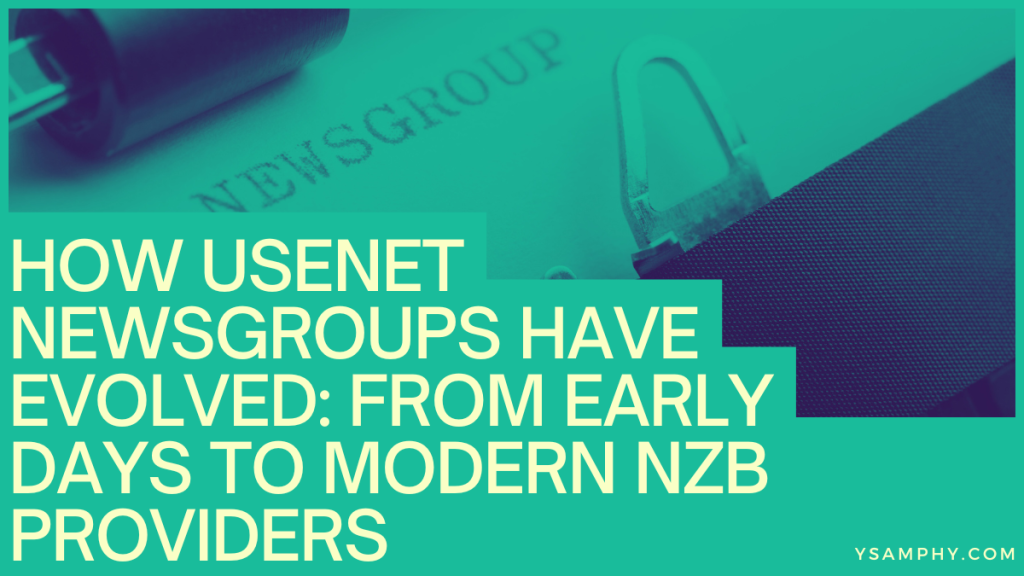Usenet newsgroups have been around for decades, offering a way for people to share information and discuss topics long before the web became popular.
In 1980, Tom Truscott and Jim Ellis created Usenet, a decentralized platform where people could engage in open discussions through what we now call newsgroups. If you were using it back then, you would have been able to post and read ‘articles’, which makes Usenet a pioneer in user-generated newsgroups, and this was all way before social media existed.
As you can imagine, it was popular so, over time, it grew and it went from being simple and basic to a thriving ecosystem of discussions on various topics, all neatly organized.
But as it grew, it became more complicated to navigate through, so people needed new ways to find and access specific articles, which is the reason behind developing modern tools we know (and likely use) today.

The Early Days of Usenet
In the beginning, this was a simple platform based on text. No flashy interfaces, no advanced search functions… Just a collection of newsgroups, which were sorted into categories. Its users could post articles and read discussions, but you had to find all the newsgroups manually and that took a long time.
Newsgroups were the heart of Usenet; they were organized by topics like news, science, and technology, and they were the place of rich discussions.
The Big 8 newsgroups, which were established in the mid-1980s, became the center of Usenet and people still use them to this day. They cover topics from computers to recreation.
The Rise of Newsgroup Categories and Organization
Usenet became popular for obvious reasons, but as more and more people joined, it was clear that its organizational system needed a makeover. The newsgroups evolved and included specialized categories so they were easier to navigate, and topics were split into categories.
Then, subcategories were introduced and there were specific spaces for all discussions. This helped – to some extent. The number of newsgroups and articles continued to grow, though, so trying to find the right newsgroups was still an issue.
Usenet’s infrastructure stayed decentralized, which means that no single entity controlled it. Its open nature was one of the best things about it and one of the worst.
Anyone could create a newsgroup, but there was no unified search tool and the sheer volume of newsgroups made it increasingly difficult for users to find what they were looking for.
Usenet Today
Now, we fast forward a couple of decades.
Today, Usenet is still a decentralized network, but the vast amount of newsgroups made it hard to find specific articles until recently.
According to Techradar, due to user feedback, Usenet providers (today) offer retention periods exceeding 15.8 years. This means that articles posted over the last decade and a half can still be accessed; showing significant improvements compared to the early days.
Although technology has advanced, to say the least, the traditional way of manually searching through newsgroups to find what you’re looking for takes too long and it’s way too cumbersome. Enter NZB providers.
They’ve revolutionized the way we access Usenet. Think of an NZB file like a map that can help you pinpoint where a specific article is within the Usenet system. NZB providers index Usenet articles and organize them so they’re easy to find. These files help you locate specific articles within newsgroups swiftly.
Essentially, NZB providers are navigational tools for Usenet and thanks to them, you no longer need to spend time manually browsing through countless posts. Now, even people who found it overwhelming to use Usenet will find it easy and accessible.
According to Techradar, finding specific articles is no longer a cumbersome task (thanks to NZB files). NBZ providers, with their 99% article completion rates, ensure the user can locate/download files with minimum effort.
Security is another aspect that was significantly improved. Usenet articles are often encrypted with SSL, so if you’re concerned about privacy while accessing it – you don’t have to be.
Based on data from Comparitech, Usenet providers offer 256-bit SSL encryption to protect privacy while browsing and downloading, making user convenience their top priority.
All in all, Usenet has evolved into a user-friendly platform in today’s world that’s driven with and by information.
The Future of Usenet
It doesn’t seem like technology will stop evolving (thankfully!) anytime soon, and neither will Usenet. It might not ever become mainstream as modern social media platforms (or it will, we don’t know), its role as an open forum for uncensored discussions will stay just as important as it’s ever been.
NZB providers will continue to play a huge part in making sure that anyone that accesses it can navigate it effortlessly. In the future, NZB providers might integrate even more advanced search methods or offer some extra features to make the experience of using Usenet even better.
As long as Usenet exists as a platform for free discussion, the tools that make it accessible will stay an integral part of its ecosystem.

Conclusion
If you’re one of the privileged ones who’ve known Usenet since the 80s, you can see how far it’s come from a simple, text-based platform for academic discussions.
Today, it’s more powerful than ever and it’s also easier to use than ever.
Today’s modern tools have streamlined the Usenet experience and it’s more accessible and secure than it used to be.

